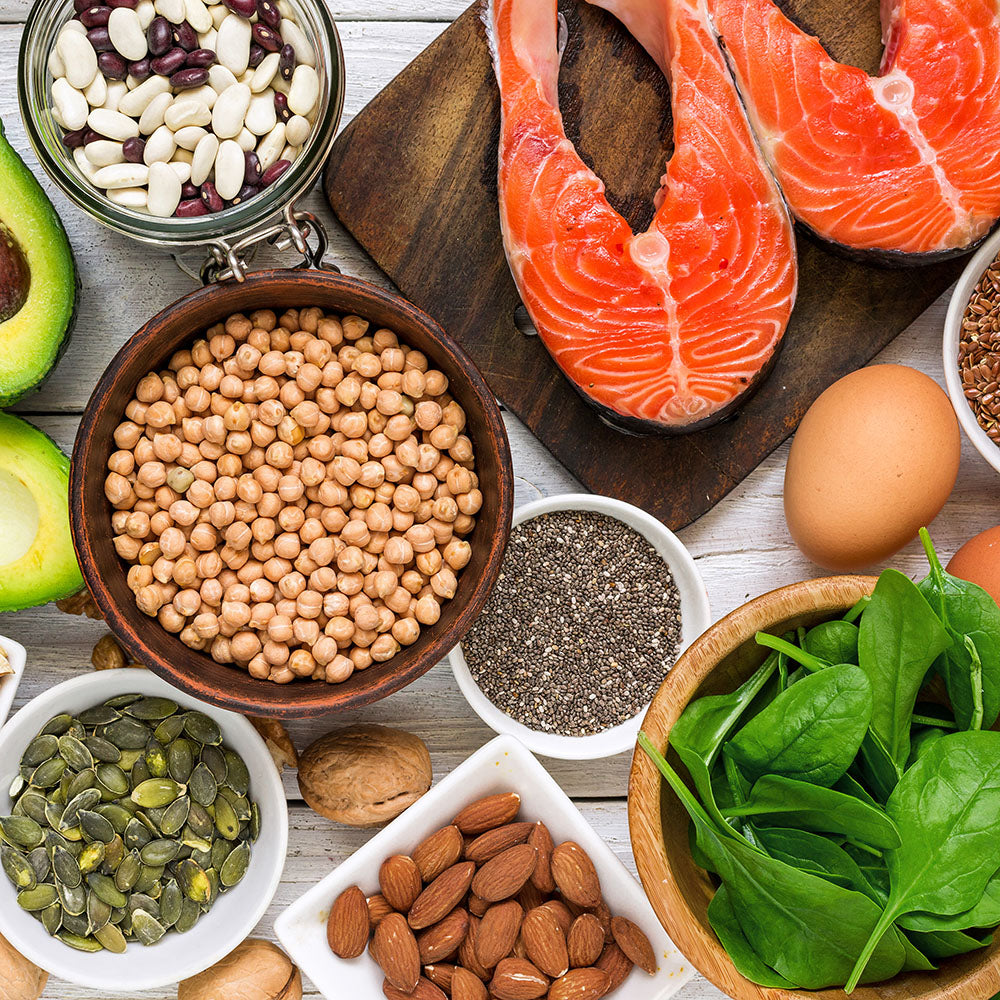Balance should run through the currents of your everyday life. From your diet, to work-life, to relationships, balance brings joy and harmony. Learning the art of balance will help improve your overall health.
Balance is also vital when we talk about the Omega fatty acids family. These essential fats are integral to your diet, but you need to know how much or how little of them to eat. By looking at their differences and knowing which foods carry Omega fatty acids, we can start to find the balance that works best for you!
Fatty Acids: The Basics
Fatty acids are the building blocks of fat in your body. When you eat foods containing fats, your body breaks those fats down into fatty acids, which are absorbed into your blood. Fatty acids form into groups of three, known as triglycerides. You also get triglycerides when you eat foods containing carbohydrates.
What does your body need fatty acids for? They play a key role in energy storage. When your body runs out of glucose for energy, it resorts to your stores of fatty acids for fuel.
What is the difference between saturated and unsaturated fats?
Fatty acids can either be saturated or unsaturated, and you probably know that saturated fats are the “bad” kind. The main difference between these two fats is that saturated fats tend to be solid and come from animal sources, whereas unsaturated fats tend to be liquid and come from plant sources.
Common examples of saturated fats include:
- Red meat such as beef
- Full-fat dairy products
- Processed meats such as sausages and bacon
- Processed foods such as cookies and chips
- Coconut oil and palm kernel oil
Your body needs some saturated fats, but they shouldn’t count for more than 5-6% of your daily diet according to the American Heart Association.
Common examples of unsaturated fats include:
- Olives and olive oils
- Vegetable and plant oils
- Salmon, anchovies, tuna (omega-3’s)
- Nuts and seeds
- Avocados
If you have the choice between saturated and unsaturated fats, unsaturated are usually better. Your body needs both monounsaturated fats (peanut oil, olive oil, nuts, seeds, avocados) and polyunsaturated fats (fatty fish, walnuts, flaxseeds, sunflower oil, soybean oil, chia and hemp seeds).
Now that we understand the difference between saturated and unsaturated fats, we can talk about a specific group of unsaturated fats: Omega fatty acids.
Health Properties and Benefits of Omega Fatty Acids
The three Omega fatty acids to know about are Omega-3, Omega-6, and Omega-9. Omega-3’s and Omega-6’s are polyunsaturated, and Omega-9’s are monounsaturated. These fatty acids are also known as “essential fats” because your body needs them but cannot make them on its own. Therefore, you have to get Omega fatty acids from your diet.
You should know the properties and health benefits of each of these fatty acids, and how to find them in the foods you eat. Let’s look at each one individually!
Omega-3 Fatty Acids
The most commonly known fatty acids are Omega-3’s. As an essential part of human cell membranes, these fatty acids really can do wonders for your energy and brain function. They also have anti-inflammatory properties.
What’s great about this Omega fatty acid family is that they have so many wonderful health benefits for all ages! It’s been known to help prevent Alzheimer’s disease, cancer, and the symptoms of asthma from an early age.
One way these fatty acids help fight chronic diseases is by boosting the amount of “good” HDL cholesterol in your body which will help you fight off the “bad” LDL cholesterol. So, it is a fighter!
Also, Omega-3’s are a good mood booster. They help alleviate symptoms associated with mental health issues like depression, bipolar disorder, and even schizophrenia.
Foods that contain Omega-3 fatty acids are:
- Salmon
- Mackerel
- Oysters
- Anchovies
- Chia seeds
- Flaxseeds
- Spinach
- Brussels sprouts
Omega-6 Fatty Acids
Another “essential” fatty acids group, Omega-6’s are pro-inflammatory. I know what you may be thinking: ”Don’t we want to reduce inflammation in our bodies?”
But remember, it’s all about balance in your diet. Omega-6’s pro-inflammatory properties are essential to your immune system and are an important part of fetal and infant brain development.
Just be aware of how much you consume. The Western diet already has a good amount of Omega-6 fatty acids in it, with foods like mayonnaise and oil-fried foods, so there is no need to take Omega-6 supplements except in rare cases but we recommend taking fat digesting supplements that can help you digest more easily.
Foods containing Omega-6 fats are:
- Soybean oil
- Corn oil
- Mayonnaise
- Walnuts
- Almonds
- Cashew nuts
- Sunflower seeds
Omega-9 Fatty Acids
And last, but certainly not least, Omega-9’s can support muscle growth when balanced. This is a great fatty acid that few people talk about. Medical experts believe it can improve insulin sensitivity and decrease inflammation and the “bad” cholesterol in your body. As a result, your heart will be less at risk in the long-run if you consume Omega-9 fatty acids.
Foods containing Omega-9 fats include:
- Olive oil
- Cashew nut oil
- Almond oil
- Avocado oil
- Eggs
- Macadamia nuts
How to Balance Your Essential Fats
Striking a balance between these three fatty acids may seem like a math equation, especially because many foods may contain more than one type of Omega fatty acid!
For Americans, it is generally best to lower your Omega-6 intake and shoot for bumping up your Omega-3 and Omega-9 in your weekly eating habits. The average American diet tends to include common foods with Omega-6 fats in them, but less so for foods with Omega-3’s and Omega-9’s.
Tips for including Omega fatty acids into your diet regimen
We are all on the go, and as someone who stays pretty busy, I know it can be hard to change your diet! Fear not. You are most likely already consuming these fatty acids.
Omega-6 is found in a lot of seeds and nuts such as flaxseeds, pistachios, sunflower seeds, and pumpkin seeds.
You can easily reduce the prevalence of Omega-6’s in your diet by switching out mayo-based dressings for olive-oil based ones, with a squeeze of lemon for a fresh, healthier, and balanced meal! Also, try cooking with olive oil — which is high in Omega-9 fatty acids — instead of veggie oil. If you want to switch it up, you can use sesame oil as a substitute.
I also get some of my Omega-9 fats from avocados, almonds, and cashews.
I know not everyone likes the taste of fish, which is why Omega-3 supplements are pretty popular. Just be sure to check the label and identify if the brand monitors and filters out as much mercury and other metals found in fish as possible. You should not need to worry about taking supplements for Omega-6’s and Omega-9’s.
Balance Is The Key to Any Diet
In the end, you can truly improve your Omega fatty acids intake by consuming more plant-based oils, nuts, and seeds.
I want you to be healthy so your true self can shine. Like all parts of nutritional healing, intentional balance is key for your mental, emotional, and physical health. Check out the rest of my website, www.serenaloves.com or find me on Instagram for more tips and join me in finding harmony.
Have a healthy day!
XO – Serena





